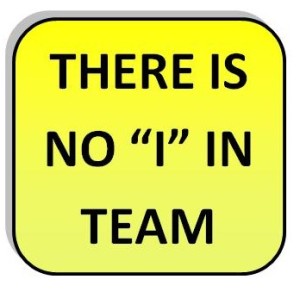Tag: career
Mentors: Who needs them?
 Mentors play a crucial role in the life of a professional however, am I the only one who has been greatly underwhelmed with professional mentorship programs? My experience with them is that companies have them because they look good on paper and it is the right thing to do, however the execution and follow through is abysmal. The idea that you can pick a set of names from a hat, pair them together (or in some cases assign groups of mentees to one mentor) and just expect that it will all work out for the good of the mentee is gallant, but it is an approach that is designed to fail the masses.
Don't get me wrong I do believe in mentorship, however I think that a lot of thought and evaluation has to go into the relationship. In my book, HOW TO MAKE IT FROM THE CLASSROOM TO THE CUBICLE, I have tackled this relationship and broke them down into the following categories:
Mentors play a crucial role in the life of a professional however, am I the only one who has been greatly underwhelmed with professional mentorship programs? My experience with them is that companies have them because they look good on paper and it is the right thing to do, however the execution and follow through is abysmal. The idea that you can pick a set of names from a hat, pair them together (or in some cases assign groups of mentees to one mentor) and just expect that it will all work out for the good of the mentee is gallant, but it is an approach that is designed to fail the masses.
Don't get me wrong I do believe in mentorship, however I think that a lot of thought and evaluation has to go into the relationship. In my book, HOW TO MAKE IT FROM THE CLASSROOM TO THE CUBICLE, I have tackled this relationship and broke them down into the following categories:
Time waits for no one
I woke up last Saturday morning pondering on the whirlwind week I had and wondered how quickly time went by: by the time this weekend is over I travelled about 7500 miles by air and road combined. I thought about the fact that it was already October and that the year was coming to a close, this is when the idea for today’s blog, “Time waits for no one”, came to mind.
For my friends who are in university, you may be thinking the same thing that came to my mind when I thought of this topic. The fact that as a student there are different courses and social activities grabbing for your attention and you always seem to be playing catch up. For others it is procrastination; putting off what you can do today, until tomorrow. The problem with that approach is that tomorrow, something else pops up with the same or higher priority, which is then added to the list. Before you realize, the list compounds and you are faced with multiple due dates and little or no time to get things done.
It is out of this today’s advice is borne:
Don’t put off for tomorrow what you can do for today.
It is an important ideal that transcends all aspects of life, but particularly in school, there is a greater context that needs to be focused on.Making proper use of your time is also extremely important when thinking about building a career. Allow me to explain. What you do today has a direct bearing on what you will achieve years from now. How many times have you said to yourself, “This year I will apply to university or graduate school”? Or, “I am going to get that certification that will make me more marketable employee”? Or, “I am going to look for a new job”. Maybe it has been applying for that manager role that you keep psyching yourself out of going after.
With goals that have a longer term, like those mentioned above, it does not seem that big of a deal to defer a task to the next week or month at that actual moment, however as time goes by you find yourself with a decreasing desire to take action. As a result you would have to make double the effort to do what would have been much easier had you done so earlier. I myself have been guilty of such offences. I recall when I was writing my book, HOW TO MAKE IT FROM THE CLASSROOM TO THE CUBICLE, there were many stops and starts and with every restart it seemed harder than the time before. However, at one stage when I was not content with the progress that I had made, I challenged myself to finish. From that point onward, I became super focused and structured all my free time to get the job done. For those of you who have read the book can attest to the pride that I feel knowing that I am now an author.
As you read this blog today, think about goals that you have set years ago and that for some reason got de-prioritized because you deferred and deferred until you lost any desire to revive. Today is a good day to start a fresh and to make a concerted effort to finish. Do not be like the many, who due to their idleness ended up missing out on crucial opportunities to advance their personal and professional lives. Take up the challenge today, I guarantee it, you will be happy you did.
Until next time remember: As long as you have life, you should live it to your fullest potential.
What is the big deal about Resumes?
 Far too many individuals under-utilize this important career tool. I have seen instances where individuals were more than qualified for a particular position, but because their resume did not showcase their qualifications properly they were overlooked for an interview. So what is the big deal about resumes anyway? Today I will share with you how resumes can make or break your job search.
Before I share some advice, I will start with this; there are many resources online, so there are not many excuses you can offer for not knowing what type of resume is required for your specific professional field. I will go further on to say that my experience includes spending a considerable portion of my time on recruiting. Which means that for each of the many interviews and professional screenings I have conducted, there were scores of resumes reviewed. That number has definitely tallied into the thousands to date. Therefore it is out of this qualified experience I present these tips. Here goes:
1. Don't lie - of all of the do's and don’ts this gets you in the most trouble. If you want a definitive statement on this point, I offer this: Assume that every fact on your resume will be checked. There are some instances when a candidate can be forgiven for exaggerating or overselling his/her experience, especially in cases where they were really trying to make something mundane seem really important or significant. Generally a good interviewer knows how to get clarity on these matters. However a full-fledged lie like, graduating from a university that you did not attend or never completed is an immediate disqualification and blacklisting.
2. Be as concise as possible - resumes that are unnecessarily too long can be subject to the same time treatment as a short resume. When faced with a 3 or more paged resume I usually skip through the sections. Quite frankly, I read the current or most recent experience and then jump to the education section. Only if something in those sections catch my eye, then I reluctantly read on. If not, I move on to the next resume. This means that there may be some very qualified persons whose resumes have come across my desk, but because they were too verbose I passed them over. You have to understand that at any given moment there may be several to dozens of resumes to review, so on a light day I may be prone to spend more time on each one, but on heavier days super long resumes have very slim chances if the relevant experience that I need is not on the first page.
3. Tailor your resume to the position applied for - as a follow-up to point 2, if you do find yourself with a lot of facts to showcase pick the ones that are relevant to the position that you are applying for. In other words if you are applying to be a Financial Analyst, that job you had during high school cleaning tables at the local ice-cream shop may not make the cut. The essence of a resume is not to put every single experience you ever had (even though strong cases can be made for junior hires) but to showcase only the experience that help match you to the position that you are applying to.
4. Use a cover letter - there may be some instances that you want to be more verbose in explaining a certain part of your experience. A cover letter as an attachment to your resume is a very useful item. For example, you have taken a year off of work to travel as a volunteer, or you took time off to raise a child. You may want to use a cover letter in these cases as the time gaps on your resume may not translate well with your prospective employer. There was one in particular that I recall who felt the need to explain why they had 4 positions within 12 months, turned out to be for very plausible reasons. Without it, I would have been left wondering as to what took place. A cover letter gives you a chance to answer before any questions are asked, see this as the ultimate fail-safe.
5. Follow up - when the resume is submitted, the process has only just begun. You will be well served to follow up any application with an email or phone call. The follow up is not for the employer, the follow up is for you. Too often people just apply and don't follow up. You are leaving things to chance when you don’t follow up. When you follow up correctly and strategically, then you would not give the impression that you are stalking the individual who is processing the applications. Don't leave your future up to chance; follow up at least for a confirmation of the receipt of your application.
There is too much info on this topic to write it all in one blog, so another time I will probably share from a different perspective. However, I will like to remind you that the interview process begins once you submit your resume and in some instances you are halfway there once you get called in for an actual interview. An actual interview is an opportunity to build upon the initial impression rendered by your resume.
Until next time remember: As long as you have life, you should live it to your fullest potential.
Far too many individuals under-utilize this important career tool. I have seen instances where individuals were more than qualified for a particular position, but because their resume did not showcase their qualifications properly they were overlooked for an interview. So what is the big deal about resumes anyway? Today I will share with you how resumes can make or break your job search.
Before I share some advice, I will start with this; there are many resources online, so there are not many excuses you can offer for not knowing what type of resume is required for your specific professional field. I will go further on to say that my experience includes spending a considerable portion of my time on recruiting. Which means that for each of the many interviews and professional screenings I have conducted, there were scores of resumes reviewed. That number has definitely tallied into the thousands to date. Therefore it is out of this qualified experience I present these tips. Here goes:
1. Don't lie - of all of the do's and don’ts this gets you in the most trouble. If you want a definitive statement on this point, I offer this: Assume that every fact on your resume will be checked. There are some instances when a candidate can be forgiven for exaggerating or overselling his/her experience, especially in cases where they were really trying to make something mundane seem really important or significant. Generally a good interviewer knows how to get clarity on these matters. However a full-fledged lie like, graduating from a university that you did not attend or never completed is an immediate disqualification and blacklisting.
2. Be as concise as possible - resumes that are unnecessarily too long can be subject to the same time treatment as a short resume. When faced with a 3 or more paged resume I usually skip through the sections. Quite frankly, I read the current or most recent experience and then jump to the education section. Only if something in those sections catch my eye, then I reluctantly read on. If not, I move on to the next resume. This means that there may be some very qualified persons whose resumes have come across my desk, but because they were too verbose I passed them over. You have to understand that at any given moment there may be several to dozens of resumes to review, so on a light day I may be prone to spend more time on each one, but on heavier days super long resumes have very slim chances if the relevant experience that I need is not on the first page.
3. Tailor your resume to the position applied for - as a follow-up to point 2, if you do find yourself with a lot of facts to showcase pick the ones that are relevant to the position that you are applying for. In other words if you are applying to be a Financial Analyst, that job you had during high school cleaning tables at the local ice-cream shop may not make the cut. The essence of a resume is not to put every single experience you ever had (even though strong cases can be made for junior hires) but to showcase only the experience that help match you to the position that you are applying to.
4. Use a cover letter - there may be some instances that you want to be more verbose in explaining a certain part of your experience. A cover letter as an attachment to your resume is a very useful item. For example, you have taken a year off of work to travel as a volunteer, or you took time off to raise a child. You may want to use a cover letter in these cases as the time gaps on your resume may not translate well with your prospective employer. There was one in particular that I recall who felt the need to explain why they had 4 positions within 12 months, turned out to be for very plausible reasons. Without it, I would have been left wondering as to what took place. A cover letter gives you a chance to answer before any questions are asked, see this as the ultimate fail-safe.
5. Follow up - when the resume is submitted, the process has only just begun. You will be well served to follow up any application with an email or phone call. The follow up is not for the employer, the follow up is for you. Too often people just apply and don't follow up. You are leaving things to chance when you don’t follow up. When you follow up correctly and strategically, then you would not give the impression that you are stalking the individual who is processing the applications. Don't leave your future up to chance; follow up at least for a confirmation of the receipt of your application.
There is too much info on this topic to write it all in one blog, so another time I will probably share from a different perspective. However, I will like to remind you that the interview process begins once you submit your resume and in some instances you are halfway there once you get called in for an actual interview. An actual interview is an opportunity to build upon the initial impression rendered by your resume.
Until next time remember: As long as you have life, you should live it to your fullest potential.

